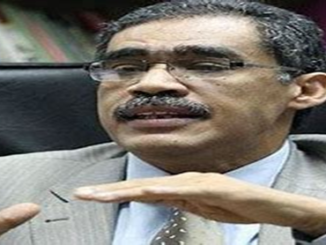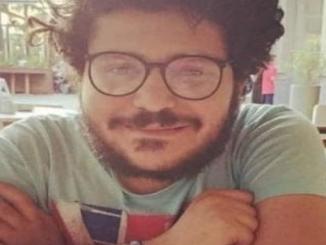
While pressure is increasing on Egyptian authorities to carry out a full and transparent investigation into the suspicious death of economic researcher Ayman Hadhoud in state custody, security forces arrested an Egyptian lawyer for criticizing the actor that personified the character of Abdel Fattah Al-Sisi in Ikhtiar-3 TV series.
Civil society and the international community have been increasing their pressure on Egyptian authorities to carry out a full and transparent investigation into economic researcher Ayman Hadhoud’s suspicious death in state custody
Nine human rights organizations issued a statement to “condemn all parties involved in concealing the truth behind the circumstances of Ayman Hadhoud’s death and his preceding detention, starting with Egypt’s National Security and Public Prosecution, and the Abbasiya Mental Health Hospital.” They added that evidence “indicates criminal violations” behind his death. Amnesty International’s own investigation “strongly suggests” that Hadhoud was “tortured or otherwise ill-treated before his death.”
Muzzled Mouths
Commenting on the deteriorating human rights situation in Egypt, Journalist Ahmed Hassan El-Sharkawi wrote on his Twitter account: “I swear by God it is not a joke: The stupid Egyptian regime has arrested an Egyptian lawyer because he wrote a post on his Facebook page criticizing the performance of the actor Yasser Galal in the TV series Ikhtiar-3 (The Choice-3)!!
The Supreme State Security Prosecution accused the lawyer Nabil Abu Sheikha of dissemination of false news and joining a terrorist group!!!”
However, there were replies from Twitter users to Sharkawh’s tweet, including “Soly” who said, “They made up a charge against him from 2021 as a pretext to imprison him for, alleging that he was not imprisoned because of his criticism of Yasser Galal’s performance, so that people would not laugh at them.”
Om El Ahrar replied to the tweet, saying, “There is nothing new in Egypt. This is the state of the regime since the coup. Mouths are muzzled.”
Also, in reply to Sharkawi’s tweet, Diea Kamal just put laughing faces, a kind of mocking the regime.
They deserve answers
“Ayman [Hadhoud]’s family deserves answers. Why did the authorities detain him and then deny having him in custody, when he had in fact died over a month earlier in suspicious circumstances? These questions point to acts of torture and enforced disappearance, which the authorities must respond to,” said Lynn Maalouf, Amnesty’s Middle East and North Africa research director.
Prosecutors’ first step was to haul in Hadhoud’s brother, Omar Hadhoud, for questioning after he raised questions over his brother’s death. Omar said that he could not rule out criminal suspicions after seeing bruises on his brother’s body and fractures in his skull, but he has not (yet) pressed any charges.
Meanwhile, the parliamentary committee of the Reform and Development Party, of which Hadhoud was a member, urged the government to launch an inquiry into the state of the country’s psychiatric hospitals.
Further pressures
Pressure also came on other fronts, with the UN and EU raising fresh concerns over other elements of Egypt’s human rights record.
On April 13, 14 UN human rights experts condemned Egypt’s “arbitrary and collective expulsions” of Eritrean asylum seekers and called on authorities to halt any further forced returns.
EU Special Representative for Human Rights Eamon Gilmore concluded his three-day trip to Egypt on the same day. During his visit, he voiced concern about the treatment of people in detention, sought clarification on authorities’ use of the death penalty, and discussed Case 173/2011 and the repressive NGO law.
According to sources who spoke to Mada Masr, Gilmore raised Hadhoud’s case during his talks with Foreign Minister Sameh Shoukry. Gilmore also aired his “genuine concern” about the Egyptian government’s ability and commitment to follow through on its National Strategy for Human Rights.
A European diplomatic source added about the talks, “To be honest, we never really believed much of what was written in that document, but we thought that the fact that this so-called strategy came out and the fact that the president of Egypt chose to head the launch himself suggested something might get better.”
Hadhoud’s case, the source went on, shows that “as our friends in the human rights community in Egypt had suspected all along, this human rights strategy is nothing but a public relations offensive.”
Text of the joint statement, titled, “Alarming Death of Egyptian Economist and Researcher Following Forced Disappearance”:
We, the undersigned organizations, express significant alarm regarding the death of economic researcher, and economic advisor and member of the liberal Egyptian Reform and Development Party, Mr. Ayman Hadhoud, who died while in the custody of Egyptian security forces following his forced disappearance over two months ago.
Ayman was last seen by his family on February 5, 2022. The Ministry of Interior claims that Ayman was never forcibly disappeared, that the appropriate legal steps were taken, and that he was later transferred to the Abbasiya Psychiatric Hospital in Cairo based on a referral from the Public Prosecution.
Even more concerning, the account of Ayman’s family, who have spent the last two months searching for him, points to the complicity of the security apparatus and the hospital. After Ayman disappeared, security officials informed the family that he was in the custody of State Security in al-Amiriya and questioned one of his brothers about his work and social media posts. The family later learned that Ayman had been transferred to Abbasiya and placed under observation. Ayman’s brother, however, still could not find him or locate hospital records showing he had been admitted. Doctors later confirmed Ayman’s presence at the hospital and said that he had been brought by security officials, but that any further information could only be provided with permission from the Public Prosecutor. Attempts to see or visit with Ayman were never successful.
On April 10, Ayman’s family was informed by the Nasr City Police Station that he had died. When his brother went to the police station to recover his body, he learned that Ayman had died on March 5 and had improperly been labeled as an unidentified body. At a later point, it was reported that the family members responsible for identifying Ayman’s body reported seeing bruises and wounds on the body.
Shortly after news of his death became public, and following modest public pressure, the Public Prosecution ordered an autopsy into the death. No independent doctors or family members of Ayman were present at the autopsy. A preliminary report on the autopsy is forthcoming and a final report will be issued in approximately 30 days.
The Egyptian National Council for Human Rights has held an emergency session regarding Ayman’s death and issued a statement indicating that it is monitoring the case closely. Reports of pressures being placed on Ayman’s family and other advocates are circulating. On April 11, one of Ayman’s brothers was summoned for questioning by the Public Prosecution.
Following Ayman’s burial, the Public Prosecution issued a statement on him which features a number of contradictions in the state narrative and raises concerns regarding a number of clear violations on the part of state authorities, including but not limited to authorities’ failure to confirm Ayman’s presence in state custody and a failure to notify his family in a timely manner of his transfer to the mental health hospital and his death.
Hadhoud’s tragic death is sadly one of countless examples of the Egyptian government’s disregard for preexisting health conditions of detainees and health complications developed while in detention.
We, the undersigned organizations, call on the Egyptian authorities to immediately facilitate a thorough, transparent, and independent investigation into Mr. Ayman Hadhoud’s disappearance and death. Such an investigation must be through a mechanism that is free from security intervention and that holds any perpetrators to account, irrespective of their affiliation with and role within the state apparatus. We reiterate our call for Egyptian authorities to immediately halt its practice of enforced disappearance, abusive use of pretrial detention, negligence of detainees’ health conditions, and obstruction of due process–all of which have facilitated a severe deterioration in the rule of law and created a culture of impunity.
Signatories:
The Tahrir Institute for Middle East Policy (TIMEP)
Project on Middle East Democracy (POMED)
Committee for Justice (CFJ)
Egyptian Front for Human Rights (EFHR)
Egyptian Initiative for Personal Rights (EIPR)
International Service for Human Rights (ISHR)
El Nadeem Center
EgyptWide for Human Rights
Human Rights First
Human Rights Watch
US Committee to End Political Repression in Egypt
EuroMed Rights
PEN International
Democracy for the Arab World Now (DAWN)
The Freedom Initiative
HuMENA for Human Rights and Civic Engagement
Andalus Institute for Tolerance and Anti-Violence Studies
Egyptian Human Rights Forum



